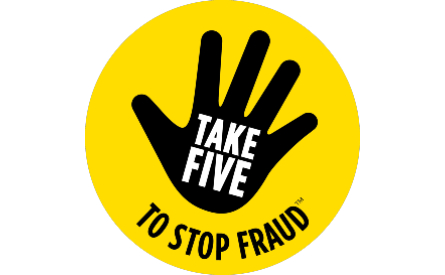- Some fraudsters use text messages to trick you into divulging sensitive information, like PINs and passwords. The message will often appear to be from a legitimate source and may ask you to click on a fake link or open an attachment.
- Links and attachments may lead to an attempt to infect your device with a virus or redirect you to a fake website which could compromise your account details.
- Fraudsters can send messages using ‘alpha tags’ from genuine companies to make their fake messages appear real (the alpha tag is the name at the top of the message, telling you who sent it).
Overlay

Take Five to stop fraud
Take Five is a national campaign that offers straight-forward and impartial advice to help everyone protect themselves from preventable financial fraud. This includes email deception and phone-based scams as well as online fraud – particularly where criminals impersonate trusted organisations.
